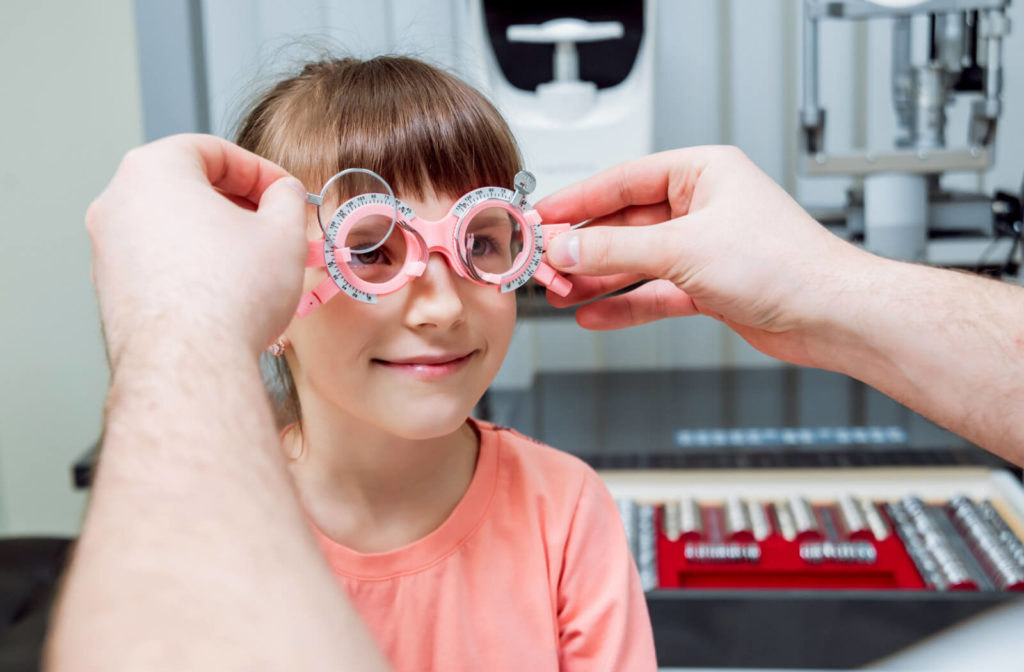Protecting Your Child’s Far Vision
You want the best for your child, and protecting their health is part of that. Children’s eye exams can help protect their sight and their eye health. Regularly visiting an optometrist is crucial for detecting eye conditions impacting their lifelong vision, such as myopia.
Myopia is a leading cause of legal blindness. Moreover, its global prevalence is steadily increasing, with health experts predicting a rise from 27% to 52% by 2050. So what options are available for myopia management?
What Is Myopia?
Myopia (nearsightedness) is a refractive error causing blurry distance vision. The condition occurs when the eyeball is too long or the cornea (clear front of the eye) is too steeply curved. As a result, when light enters the eye, it can’t effectively reach the retina(light-sensitive tissue at the back of the eye).
Myopia can cause various vision and eye health problems, depending on severity. Mild Myopia may cause slightly blurry vision with the ability to complete most daily tasks without corrective lenses. People with moderate to severe myopia have greater difficulty seeing distances, from details on a movie screen to faces across the room.
There are also significant eye health risks associated with higher degrees of myopia. Although the conditions may not develop until a person is over 40 years old, these eye problems can occur earlier—even in childhood. High myopia increases the risk of developing:
As vision develops in childhood, myopia is commonly diagnosed around school age. Vision usually stabilizes around age 20–21when the eyeball stops growing (lengthwise). However, medical conditions or environmental factors can cause vision changes in adulthood, including worsening myopia.
Can Myopia Be Reversed?
Myopia cannot be reversed. Traditional vision correction methods, such as glasses or contact lenses, can enhance vision but do not cure myopia. Adult candidates for refractive eye surgeries, such as LASIK, can experience better vision by reshaping the eye’s surface. Although not reversing the condition, vision correction surgery can (in some cases) provide a long-term fix for nearsightedness. However, not all people are candidates for refractive surgeries, partially patients with high myopia or severe astigmatism. The surgery also does not eliminate factors that contribute to myopia development.
Fortunately, there are many methods for slowing myopia progression in children. Myopia control can prevent worsening vision and reduce risks for related eye problems.
Myopia Management
Managing myopia in childhood gives children the best chance of lifelong healthy vision. Regular children’s eye exams are crucial for the early detection of myopia so that children can receive treatment as soon as possible.
Atropine Eye Drops
Optometrists can prescribe low-dose atropine eye drops to relax the eye muscles and block receptors in the retina and sclera, limiting eye growth. For most children, atropine treatment can slow myopic progression by about 50%.
The composition of low-dose atropine eye drops varies, including 0.01%, 0.025%, and 0.05% concentrations. The low dose helps maximize benefits and minimize possible side effects, such as eye irritation, redness, or swelling.
Multifocal Contact Lenses
Multifocal contact lenses are a soft contact lens option that contains multiple prescriptions in the same lens. The design features 2 zones:
- The centre corrects distance vision (similar to traditional contact lenses)
- The outer ring focuses peripheral light to slow eye growth
MiSight contact lenses are daily disposable multifocal lenses for children ages 8 and up. Many children benefit from the comfortable fit and easy maintenance, as there’s no need to clean or store the lenses. Additionally, a 3-year study showed that MiSight lenses reduced myopic progression by up to 59%.
Orthokeratology
Orthokeratology (ortho-k) is a rigid gas permeable (RGP) contact lens option. Ortho-k can significantly slow eye growth to prevent worsening myopia and enhance vision.
While the child sleeps, the ortho-k lens gently reshapes the cornea to improve vision. Then, the lenses are removed in the morning, and the child experiences improved vision for the day.
Vision improvement can last up to 2 days after removing the lenses. However, the best effects are achieved if the child consistently wears the lenses at night.
Multifocal Eyeglasses
While contact lenses can offer children freedom from glasses, some kids may not be comfortable wearing them or may have difficulty with lens hygiene. Multifocal eyeglasses work similarly to multifocal contact lenses, with a centre zone for correcting vision and an outer zone for focusing peripheral light.
An example of multifocal eyeglasses is MyoVision lenses. The myopia management eyeglasses are intended for kids ages 6–12. There are 2 lens designs:
- A central zone for correcting distance vision and an outer edge for focusing peripheral light
- An upper zone for correcting distance vision and a bottom zone for supporting close vision tasks & refocusing peripheral light
Environmental Changes
How your child interacts with the world can influence their visual development. Although children are more likely to inherit myopia from a parent, engaging predominantly with close-vision work is a risk factor. Too much indoor time focused on screens, books, or other close-work activities can worsen myopia.
Parents should encourage a balance of outdoor and indoor activities.
Visit Us for Myopia Control
Detecting and managing myopia as early as possible gives children their best chance. Myopia can interfere with their daily life and influence their lifelong eye health. Our caring, knowledgeable team is dedicated to providing personalized solutions to help your child feel comfortable and confident about their vision.
Visit River Heights Eye Care for comprehensive, trustworthy services for the whole family. Book an appointment today!


